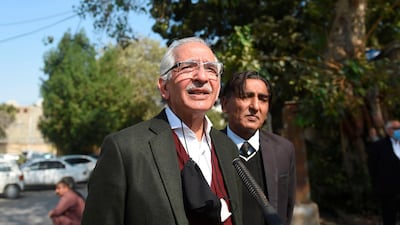A British public schoolboy-turned militant who spent 18 years on death row after being convicted of killing an American journalist, was freed by a court in Pakistan.
Ahmed Omar Saeed Sheikh could be free imminently after Sindh High Court decreed he should not be detained any longer.
Sheikh's murder conviction for killing Wall Street Journal reporter Daniel Pearl was overturned in April 2020 after the court decided he was guilty only of kidnap, with a seven-year sentence.
The decision prompted an outcry from the US government and Pearl's family, and the Sindh government immediately detained Sheikh, 47, again, using public order laws.
The family and Sindh government are appealing against the quashing of his conviction in Pakistan's supreme court.

But Sindh High Court on Thursday said the continued detention of Sheikh and three other men was illegal and they were in prison despite being innocent.
"The detention order is struck down," Faisal Siddiqi, the Pearl family's lawyer, told Associated Press.
An earlier supreme court interim order directing the men to be detained during the appeal had lapsed.
All of the men are forbidden from leaving the country and must attend future court hearings.
Pearl was kidnapped in Karachi while reporting on Islamist extremist circles in the aftermath of the 9/11 attacks.
The reporter had been investigating the link between Pakistani militants and Richard Reid, known as the Shoe Bomber after trying to blow up a flight from Paris to Miami with explosives hidden in his shoes.
Pearl was later beheaded and video of his murder was shared on the internet.
Sheikh's trial heard he had been in contact with Pearl and promised to introduce the reporter to a religious leader in Karachi. Pearl was instead kidnapped at a rendezvous outside a restaurant and held in a compound on the city's outskirts.
Sheikh was arrested and found guilty by a Pakistani terrorism court and three alleged accomplices were given life sentences. Those three were acquitted in April.
America condemned the acquittal of Sheikh and his accomplices in April, calling the decision “an affront to victims of terrorism everywhere”.
Sheikh was born in Britain and studied at the London School of Economics where he is believed to have become radicalised.
He later travelled to South Asia and linked up with Pakistani militant groups fighting in Indian-administered Kashmir.
He was jailed in India in 1994 for helping to kidnap three Britons and an American.
He was released in 1999 as part of a hostage swap with Pakistani militants who had hijacked an Indian airliner.
A later investigation into Pearl's death led by a former colleague, Asra Nomani, and a Georgetown University professor, in 2011 claimed the wrong men had been convicted.
The Pearl Project report concluded Pakistani authorities used perjured testimony to pin the murder on Sheikh.
While Sheikh orchestrated the kidnap and considered demanding a ransom, it was actually the Al Qaeda mastermind of the 9/11 attacks, Khalid Sheikh Mohammed, who killed Pearl, the report claimed.

